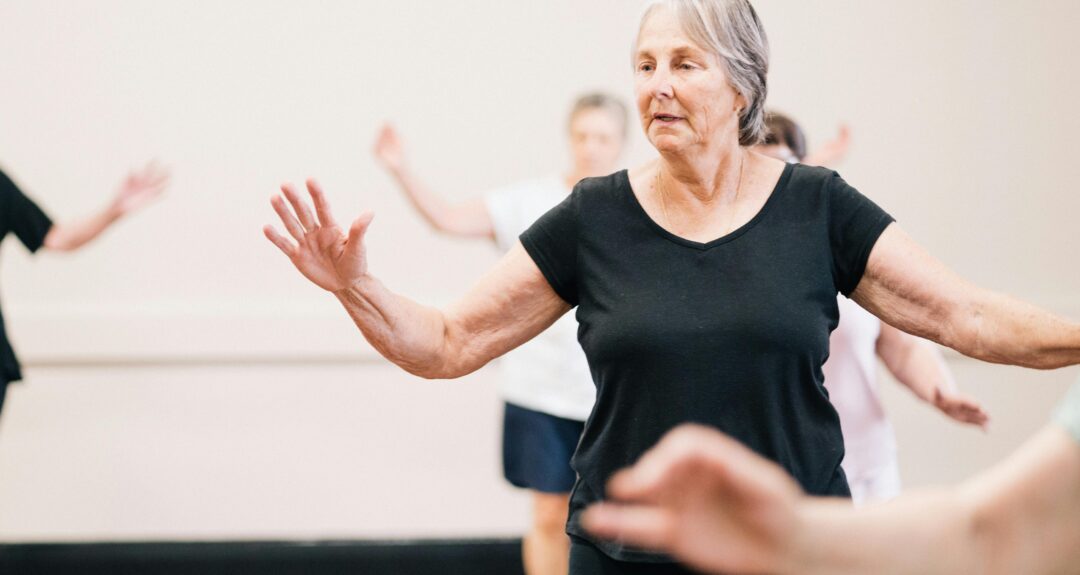Written by Elisa Withers. Physiotherapist and Pilates Instructor.
What is Parkinson’s?
Parkinson’s is a progressive neurological disorder. This means that it causes problems in the brain and gets worse over time. The condition is caused by a lack of the chemical in the brain called dopamine. And this is because some of the nerve cells that make it have stopped working.
Around 153,000 people live with Parkinson’s in the UK and it’s the fastest growing neurological condition in the world.
Symptoms include tremors and slowness of movement which start gradually. While there is no cure for Parkinson’s, various treatments, including exercise, have been shown to help symptoms and improve functional abilities. One such exercise is Pilates—a low-impact workout focusing on core strength, flexibility, and body awareness. Here, we will explore the benefits of Pilates for individuals with Parkinson’s, supported by research evidence.
What is Pilates?
Pilates, developed by Joseph Pilates in the early 20th century, emphasises controlled movements, alignment, and breathing. It aims to strengthen the body’s core muscles, train upright and aligned posture, enhance flexibility, improve balance and promote overall physical and mental well-being. The adaptability of Pilates exercises makes it suitable for various fitness levels, including those with neurological conditions like Parkinson’s.
Benefits of Pilates for Parkinson’s
1. Improvement in Balance and Postural Stability
Balance is commonly affected in Parkinson’s and increases the risk of falls. Pilates exercises enhance balance by strengthening core abdominal, hip and lower leg muscles and improving posture. A randomised controlled trial (2018) by Mollinedo-Cardalda, I. et al., highlighted that participants with Parkinson’s showed significant improvements in dynamic balance after an eight-week mat-based Pilates program and suggested this positively reduced the risk of falls (1).
2. Enhancement of Muscle Strength and Flexibility
Muscle stiffness and reduced flexibility are common symptoms of Parkinson’s. Pilates emphasises controlled stretching as well as eccentric strengthening. Eccentric strengthening involves training muscles by contracting them while they are lengthening (or being stretched). Research by Cardalda, I. et al., (2023) indicates that Pilates training led to significant improvements in muscle strength and range of motion in individuals with mild to moderate Parksinson’s (2).
3. Improvement in Gait and Mobility
Gait, or walking, disturbances, such as shuffling steps and reduced arm swing, are symptoms of Parkinson’s. Pilates focuses on enhancing coordination and promoting efficient movement patterns. A study by Júlia de Faria et al., (2023) has shown that high-intensity Pilates exercises significantly improve gait speed and lower limb strength in Parkinson’s patients, contributing to better mobility and independence (3).
4. Cognitive Benefits
Cognitive ability is a concern for many individuals with Parkinson’s. Mind-body exercises like Pilates require concentration and mindfulness, which can stimulate cognitive functions. While specific research on Pilates and cognitive improvement in people with Parkinson’s is limited, mind-body exercises have been associated with enhanced cognitive performance in older adults, suggesting potential benefits for those with Parkinson’s.
5. Improved Quality of Life
Engaging in regular physical activity, such as Pilates, has long been associated with improved mood and overall well-being. The focus on breathing, relaxation, and controlled movement in Pilates can reduce stress and anxiety for everyone. The Parkinson’s Foundation UK, highlights that Pilates can help with movement difficulties experienced in Parkinson’s which offer a better quality of life (4).
Safety Considerations and Recommendations
While Pilates offers numerous benefits, it’s essential to approach the practice with safety in mind, especially for individuals with Parkinson’s:
- Before starting any new exercise program, individuals with Parkinson’s should seek advice from their consultant or GP to ensure the exercises are appropriate for their specific symptoms.
- Always seek out a certified Pilates instructor who is experienced in working with neurological conditions to ensure that your exercises are safe and specific to your needs.
- Create a consistent routine. Regular practice is crucial for reaping the benefits of Pilates and for sustained improvements in mobility, balance, and overall well-being.
Pilates for Parkinson’s!
Pilates offers a fun and holistic approach to addressing signs and symptoms of Parksinson’s. The emphasis on core strength, flexibility, balance, and mindfulness aligns well with Parkinson’s. Pilates stands out as an evidence based and valuable form of exercise for enhancing quality of life and independence for those navigating the challenges of Parkinson’s. For more help and information on living with Parkinson’s, you can contact The Parkinson’s Foundation UK which provides a wealth of valuable resources and free telephone support at www.parkinsons.org.uk
References
- Effect of a Mat Pilates program with TheraBand on dynamic balance in patients with Parkinson’s disease: Feasibility study and randomized controlled trial (2018) by Mollinedo-Cardalda, I.; Cancela-Carral, J.M.; Vila-Suárez, M.H.
Rejuvenation Res., 21, 423–430. Link: Effect of a Mat Pilates program with TheraBand on dynamic balance in patients with Parkinson’s disease: Feasibility study and randomized controlled trial (2018) - Cardalda, I., Oliveira, I., Suárez, H., & Carral, J. (2023). Is high intensity Pilates exercise treatment beneficial for people with Parkinson´s disease?. Retos. https://doi.org/10.47197/retos.v48.96771.
- Multicomponent and mat Pilates training increased gait speed in individuals with Parkinson’s disease when walking and carrying a load: A single-blinded randomized controlled trial. Júlia de Faria 1, Lucas Resende Sousa 2, Ana Cláudia Pamplona Dorásio 3, Miriam Pimenta Pereira 3, Renato Moraes 1, Luciano Fernandes Crozara 4, Camilla Zamfolini Hallal 3https://pubmed.ncbi.nlm.nih.gov/37395268/
- Parkinson’s UK. https://www.parkinsons.org.uk/information-and-support/your-magazine/experts/pilates-and-parkinsons

